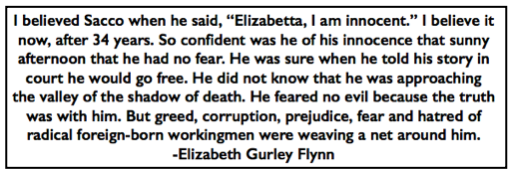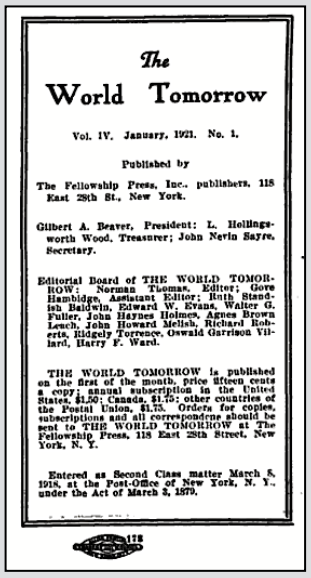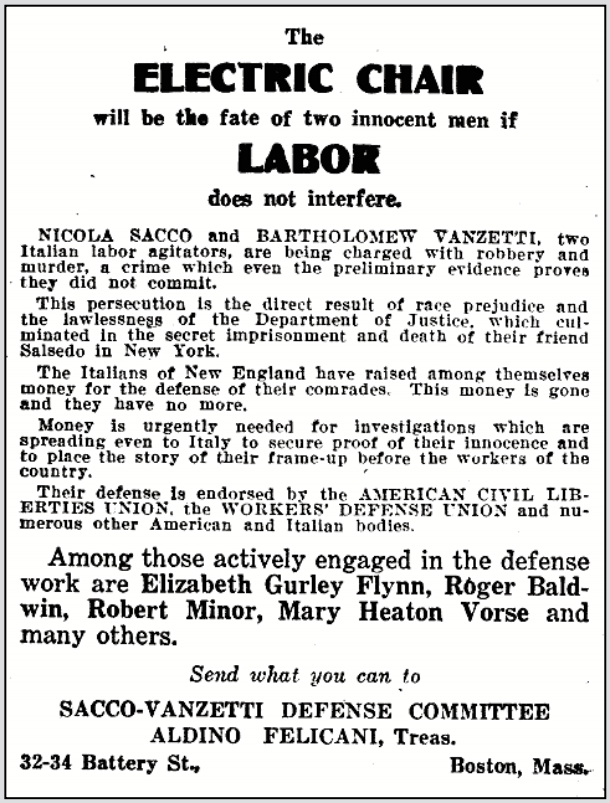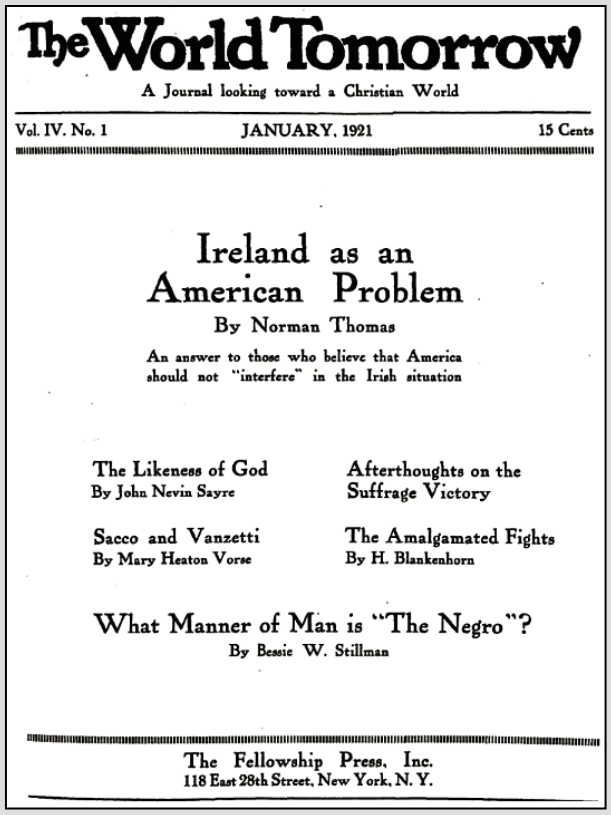 ———-
———-
Hellraisers Journal – Wednesday January 5, 1921
Dedham, Massachusetts – A Visit with Nicola Sacco, Gallant Fighter
From The World Tomorrow of January 1921:
Sacco and Vanzetti
By MARY HEATON VORSE
WE drove through the sweet New England towns on our way to the jail in Dedham , where Nicola Sacco has been sitting for six months , deprived of all occupation, waiting his trial.
He is accused of having killed two men on April 15th and having made off in an automobile with $ 18,000 from the pay roll of the Slater and Morrill Shoe Plant in South Braintree. Labor is again on trial in Massachusetts.
Bartolomeo Vanzetti is also accused of this crime. But he is not in Dedham Jail because he has already begun serving a fifteen year sentence in Charlestown. On December 24th, 1919 , there was an attempted hold-up in Bridgewater of another shoe company. No arrests were made-not until May 5th, 1920. There were eighteen people who swore an alibi for Vanzetti. Eighteen people testified that on the afternoon and evening of December 24th Vanzetti was selling eels in Plymouth, for eels on Christmas Eve are to Italians what turkeys are to us on Thanksgiving. These witnesses knew Vanzetti very well, for he was a fish peddler in Oldtown, where they lived. But the testimony of these eighteen people did not count with the American jury. There were three people who identified Vanzetti as the man whom they had seen six months before driving in an automobile, from which shots were fired in Bridgewater. One of the women who identified Vanzetti was blind in one eye. But their identification convicted him.
As for Sacco, not one of the people brought in to identify him swear that this was the man they saw shooting, yet he is held without bail.
But Sacco and Vanzetti are offenders of another sort than criminal offenders. They have both taken an active part as labor leaders among the Italians. Not only were they gallant fighters, both of them, but they were inconveniently holding meetings about Salsedo– Salsedo, who went crazy—maybe—and on May 1st jumped from the fourteenth floor window of the Post Office Building in New York City, where he had been illegally detained by the Department of Justice agents for months—the only man who died in Mr. Palmer’s great May Day revolution. Among the Italians there is a ghastly suspicion that Salsedo did not jump-anyway, it was mighty inconvenient having young men holding meetings about him.
It would make your blood run cold to read the statement made by Elia, who was also detained in the Post Office Building and who heard Salsedo’s shrieks when they tortured him. This statement begins, “I am afraid of the agents of the Department of Justice and I do not want this made public until I leave the country.”
So meetings among Italians about Salsedo and Elia were not popular, and a crime had been committed in East Bridgewater for which convictions were wanted. Well, Sacco and Vanzetti are in jail now.
Dedham jail is a model jail. You go into a big hall off which are four corridors; a gallery runs around the second story and four more corridors leading from it. It has the vague air of a library turned into a jail. Even the warden, in his neat blue clothes and close-clipped moustache, looks more like a librarian than a warden. But instead of books, they put men on the shelves; they keep young men and old in the pigeon holes of cells on the galleries. Men grow old on the shelves of the large, light jail where the warden reads the Outlook and keeps a flower on his desk.
As we waited, men in the jail uniform of field-gray trousers and shirt of narrow blue-and-white stripes came and went, their hands clasped after the manner of some sort of penitent. It made one nervous to see them walking, their hands clasped in front of them in that unnatural, meek fashion.
After a time Sacco appeared-a little fellow, well built, alert, so life-loving that even six months of inaction in jail had not effaced his vividness. Short, clean-cut as a Roman coin, eyes that looked at you straight, and above all a friendly way with him almost like a child who had never known anything but affection. There was something vivid about Sacco that made you think of swift, happy flashing things-jumping fish, a bird on the wing . . . .
Prisoners always have something they want; Sacco was no exception. What he wanted was work. “ Couldn’t you make them let me work?” he begged. “I have never loafed one day in my life.” He held out his hands, swift-moving hands, the sensitive hands of a sure workman. “I am used to work. If they won’t let me work, better they kill me right off, for anyhow I die.”
We sat down and Sacco told us how he came to America, how he got interested in books and in ideas and then in “The Idea,” which is the way he and his wife always speak of social justice—The Idea, the one great Idea, something to work for, something to suffer for.
Sacco was saying: “If I am arrested because of The Idea I am glad to suffer. If I must I will die for it. But they have arrested me for gunman job. What have I worked for all my life? I have worked for educate myself, my comrades. Only so we go on, by learning. Do I want to go back to gorilla day, shooting man in the back? Why should they say I do things like that, when I love all people—my wife, my child , ideas? I love them all the same. Always my wife and I we try help everybody. We give little theater shows, we get money for strikes. We get money for all people who need help-not only our own comrades, Catholics, all people.”
Loving people as he did, loving learning as he did, he was wounded to the quick that he should be accused of such a crime.
I wasn’t ready for a boy like this, a boy who would wring your heart with his enthusiasm for life and learning, a boy so undimmed by his six months of waiting inactive in jail. Soon his talk drifted away from his case and his trial. He tumbled out his story. Seven years’ employment in one place, and how he missed his wife, and how he wanted to see the new baby, and how his boss had come to visit him in jail, and the boss’s wife had given him a sacred heart and he had taken it “not to hurt the lady’s feelings,” and the guard had seen it and said: “Hell, why didn’t you say you was a Catholic and you’d ‘a’ been out of here,” and couldn’t we get him some more of D’Annunzio’s books and scientific books-in Italian, could we?
And suddenly there stabbed through me the certainty that this boy wasn’t worried about himself. He didn’t even dream he could be in danger. He didn’t know what powers there were massed against him. He did not realize that he is the greatest enemy of the organized manufacturer-for Sacco has fought labor’s fight all his days. He loves people and children; he loves learning. He has another quality which his wife shares with him. Wherever Sacco and his wife pass by, they leave a trial of affection behind them. People love them for their enthusiasm, their gaiety, and their ready helpfulness. Such men are dangerous.
Maybe it is just as well he does not know this. Maybe the clear light of his confident innocence will shine out in the court room as it did in the jail that day.
A friend, with whom I visited Sacco, and I were used to seeing fine boys in jail because they have worked for “The Idea.” It was not the first time we had visited men wrongfully accused of murder who were later acquitted after having been held months in confinement, but as this boy talked on eagerly we found our eyes could not meet each other’s, we did not dare to look at each other. He had all the flaming qualities which make youth beautiful,-courage, gaiety, and love,-and he did not know that he was in danger.
This story is not all Sacco’s and Vanzetti’s. There is Mrs. Sacco of whose unbroken courage everybody, even the warden, speaks. You couldn’t hear about these imprisoned boys without hearing about Mrs. Sacco, too. Her second baby has been born since Nicola’s arrest. She has not seen him since-she has not been strong enough to. It isn’t the people in prison who do all the suffering.
There are unwritten stories of such people-Mrs. Salsedo, for instance, who waited these terrific months while they kept her husband illegally up in the fourteenth story of the Post Office Building while they tortured him until he jumped out of the window on the morning of May 1st-if he did jump.
And there is Mrs. Sacco and her new baby, keeping her courage undimmed.
I went to see her. She lives in a little bungalow on a hill with woods around it. Her little boy of seven ran to meet us. Then she came out. Her goodness is what you thought of first. No wonder people loved her. It was easy enough to imagine these two young people giving their plays for the cause of labor and for every comrade in misfortune. There is something most lovable about the quality of her beauty. Dark red hair and a sprinkle of golden freckles-more Irish than Italian she seems-and now a look of fragility, because of the baby, because of the long wait.
There is a big book published, I think, by the Russell Sage Foundation about justice and the poor. It at very big book, and what their lengthy investigation proved could be summed up in fire words:
Poor men cannot get justice.
As for active labor men, all the dice are loaded against them when the law gets hold of them. All labor is on trial with Nicola Sacco and Bartolomeo Vanzetti. It is bound up with the fight that is going on for the closed shop and the unalterable determination of the employers to smash the workers.
Labor alone can save these boys and at the same time help to win their own battle.
———-
[Added: Defense Committee ad from The Liberator of January 1921.]
[Emphasis added.]
~~~~~~~~~~~~~~~~~~~~~~
SOURCES & IMAGES
Quote EGF, re Sacco at Dedham Jail, Oct 1920, Rebel Girl p304
https://books.google.com/books?newbks=1&newbks_redir=0&id=TK2y0I-E9EkC&dq=rebel+girl+flynn&focus=searchwithinvolume&q=sacco+i+am+innocent

The World Tomorrow, Volume 4
“A Journal looking toward a Christian World”
New York, New York
Fellowship Press, 1921
https://books.google.com/books?id=X0ArAAAAYAAJ
Jan 1921
https://play.google.com/books/reader?id=X0ArAAAAYAAJ&hl=en&pg=GBS.PP11
“Sacco and Vanzetti” by MHV
https://play.google.com/books/reader?id=X0ArAAAAYAAJ&hl=en&pg=GBS.PA14
IMAGE
Ad Sacco n Vanzetti Defense, Liberator p2, Jan 1921
https://www.marxists.org/history/usa/culture/pubs/liberator/1921/01/v4n01-w34-jan-1921-liberator.pdf
See also:
The Toiler
(Cleveland, Ohio)
-Jan 8, 1921, pages 10-12
https://www.marxists.org/history/usa/pubs/thetoiler/n153-dec-18-1920-Toil-nyplmf.pdf
https://chroniclingamerica.loc.gov/lccn/sn88078683/1921-01-08/ed-1/seq-10/
Note: the “friend” with whom Vorse visited Sacco was Elizabeth Gurley Flynn; visit took place during Oct of 1920, see:
Sacco and Vanzetti
The Men, the Murders, and the Judgment of Mankind
by Bruce Watson
Penguin, Aug 16, 2007
(search: sacco vorse flynn)
https://books.google.com/books?id=MjdMq2NLYNEC
For more articles re Sacco & Vanzetti, see:
The Labor Journal
(Everett, Washington)
-Jan 28, 1921
-for article by John Nicholas Beffel
https://chroniclingamerica.loc.gov/lccn/sn88085620/1921-01-28/ed-1/seq-1/
-for article by Sacco-Vanzetti Defense Committee
https://chroniclingamerica.loc.gov/lccn/sn88085620/1921-01-28/ed-1/seq-3/
Jan 29, 1921, Appeal to Reason:
-re Attorney General Palmer v Salsedo, Sacco & Vanzetti -by Beffel
https://www.newspapers.com/clip/66964173/jan-29-1921-appeal-to-reason-re/
~~~~~~~~~~~~~~~~~~~~~~~~~~~~~~~~~~~~~~~~~~~~~
The Ballad of Sacco and Vanzetti – Joan Baez
-by Ennio Morricone


